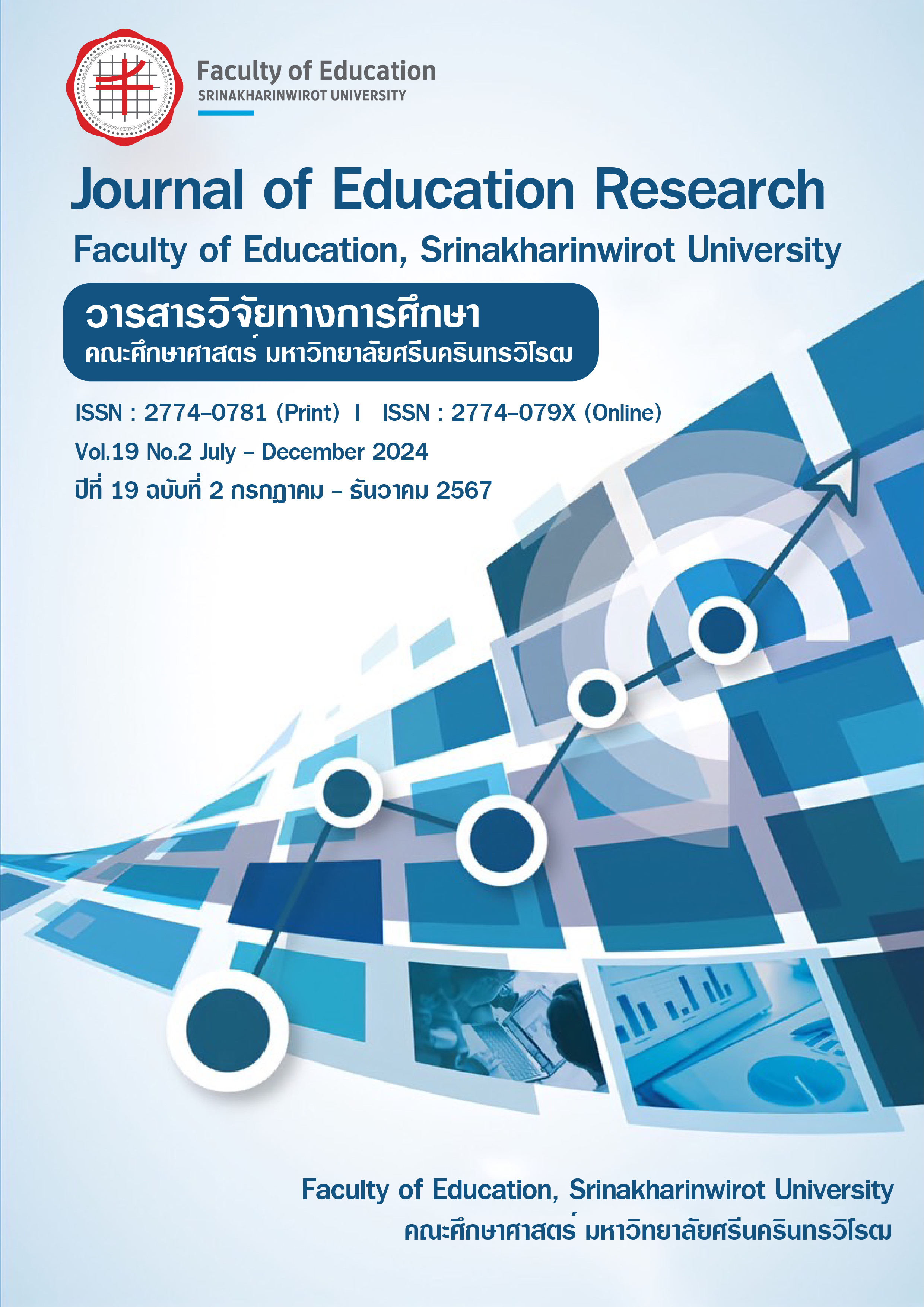THE EXPANDING OF RESULTS OF CURRICULUM DEVELOPMENT FOR EARLY CHILDHOOD TEACHERS, TEACHER ASSISTANTS AND CAREGIVERS ACCORDING TO THE PROFESSIONAL COMPETENCIES IN THE AREA-BASED EDUCATIONAL AFFILIATION AND THE EDUCATION PARTNERS
Keywords:
Teacher Development Curriculum, Area-Based Approach, Educational PartnershipAbstract
The objectives of this research were to 1) to study the professional development needs of early childhood teachers, teaching assistants, and caregivers regarding their instructional competencies, 2) develop a curriculum for early childhood teachers, teaching assistants, and caregivers that aligns with early childhood competencies and is suitable for all affiliations using an area-based approach with participation from educational partners, and 3) evaluate the quality and effectiveness of the curriculum for early childhood teachers, teaching assistants, and caregivers that aligns with early childhood competencies and is suitable for all affiliations using an area-based approach with participation from educational partners. The sample consisted of 30 early childhood teachers, teaching assistants, and 10 caregivers in Suphan Buri Province, in total 40 people, selected through multi-stage random sampling. The research instruments comprised: 1) A needs assessment interview form for professional development , 2) an evaluation form for the early childhood teacher development curriculum that aligns with early childhood competencies and is suitable for all affiliations using an area-based approach with participation from educational partners, 3) a competency assessment form for teaching and learning management of early childhood teachers, teaching assistants, and caregivers, and 4) a satisfaction assessment form regarding curriculum activities for early childhood teachers, teaching assistants, and caregivers. The statistics used for data analysis included Mean, Standard Deviation, and content analysis for qualitative data. The research findings found that; 1) early childhood teachers, teaching assistants, and caregivers expressed the highest need for developing two areas of their teaching competencies: early childhood learning experience management competency and media and innovation competency, 2) The curriculum quality assessment results showed that the overall average quality score of the curriculum was at the highest level of appropriateness (M = 4.59, S.D. = 0.55), 3) The comparison of teaching and learning management competencies of early childhood teachers, teaching assistants, and caregivers before and after curriculum training showed that the overall post-training scores (M = 4.85, S.D. = 0.46) were higher than pre-training scores (M = 4.45, S.D. = 0.64) and 4) The overall satisfaction assessment of the curriculum training revealed that early childhood teachers, teaching assistants, and caregivers reported the highest level of satisfaction (M = 4.63, S.D. = 0.56).
References
คณะกรรมการอิสระเพื่อการปฏิรูปการศึกษา. (2562). แผนปฏิรูปประเทศด้านการศึกษา. สำนักงานเลขาธิการสภาการศึกษา.
จุฬากรณ์ มาเสถียรวงศ์. (2560). โครงการประสานงานวิจัยและพัฒนาการจัดการศึกษาเชิงพื้นที่. สถาบันรามจิตติ.
โชติกา กุณสิทธิ์ พจมาน ชำนาญกิจ และสำราญ กำจัดภัย. (2563). การพัฒนาหลักสูตรฝึกอบรมเพื่อเพิ่มสมรรถนะประสบการณ์การเรียนรู้วิทยาศาสตร์บนพื้นฐานการเรียนรู้แบบใช้สมองสำหรับครูปฐมวัย สังกัดสำนักงานเขตพื้นที่การศึกษาประถมศึกษาสกลนคร เขต 1. Journal of Buddhist Anthropology, 5(3): 402–417.
ยูนิเซฟประเทศไทย. (2563). รายงานสถานการณ์เด็กในประเทศไทย พ.ศ. 2563. ยูนิเซฟประเทศไทย.
ราชกิจจานุเบกษา. (2562). พระราชบัญญัติการพัฒนาเด็กปฐมวัย พ.ศ. 2562. เล่ม 136 ตอนที่ 56 ก, หน้า 1-28.
วิไลวรรณ กลิ่นถาวร และศิริพร วงศ์ตาคำ. (2565). การพัฒนารูปแบบการอบรมโดยใช้ชุมชนเรียนรู้ทางวิชาชีพเพื่อส่งเสริมการจัดการเรียนรู้แบบลงมือกระทำสำหรับครูปฐมวัย. วารสารปัญญาภิวัฒน์, 14(3): 232-47.
สำนักงานเลขาธิการสภาการศึกษา. (2563). การศึกษาสภาพการผลิตและพัฒนาครูปฐมวัยในสถาบันอุดมศึกษาของไทย. พริกหวานกราฟฟิค.
สำนักงานวัฒนธรรมจังหวัดสุพรรณบุรี. (2563). รายงานสถานการณ์ทางวัฒนธรรมจังหวัดสุพรรณบุรี. สำนักงานวัฒนธรรมจังหวัดสุพรรณบุรี.
สำนักงานศึกษาธิการจังหวัดสุพรรณบุรี. (2563). แผนพัฒนาการศึกษาจังหวัดสุพรรณบุรี พ.ศ. 2563-2565. สำนักงานศึกษาธิการจังหวัดสุพรรณบุรี.
สำนักงานสภาพัฒนาการเศรษฐกิจและสังคมแห่งชาติ. (2562). รายงานการพัฒนาเด็กปฐมวัย. สำนักงานสภาพัฒนาการเศรษฐกิจและสังคมแห่งชาติ.
สุชาดา จิตกล้า สุดา เจ๊ะอุมา จรุงใจ มนต์เลี้ยง และสุทธิชา มาลีเลศ. (2566). ของเล่นจากวัสดุในท้องถิ่น โรงเรียนตำรวจตระเวนชายแดนบ้านเขาวัง อำเภอร่อนพิบูลย์ จังหวัดนครศรีธรรมราช. วารสารสมาคมพัฒนาวิชาชีพการบริหารการศึกษาแห่งประเทศไทย (สพบท.), 5(4): 1-13.
องค์การบริหารส่วนจังหวัดสุพรรณบุรี. (2563). รายงานผลการดำเนินงานโครงการสุพรรณบุรี: เมืองแห่งการเรียนรู้. องค์การบริหารส่วนจังหวัดสุพรรณบุรี.
Darling-Hammond, L., Hyler, M. E., & Gardner, M. (2017). Effective teacher professional development. Learning Policy Institute.
Dong, C., Cao, S., & Li, H. (2020). Young children's online learning during COVID-19 pandemic: Chinese parents' beliefs and attitudes. Children and Youth Services Review, 118: 105440.
Garrison, D. R., Anderson, T., & Archer, W. (2021). Online learning in the wake of COVID-19: Perspectives from early childhood educators. Educational Technology Research and Development, 69(1): 317-321.
Gay, G. (2018). Culturally responsive teaching: Theory, research, and practice, (3rd ed.). Teachers College Press.
Hargreaves, A., & O'Connor, M. T. (2018). Collaborative professionalism: When teaching together means learning for all. Corwin Press.
Hu, X., Chiu, M. M., & Li, H. (2021). Online learning challenges for young children during COVID-19: A systematic review. Early Education and Development, 32(8): 1112-1127.
Kim, J., & Smith, K. (2020). Early childhood education in the time of COVID-19: The importance of human interaction for holistic development. Young Children, 75(4): 15-21.
Kolb, D. A. (2014). Experiential learning: Experience as the source of learning and development, (2nd ed.). Pearson Education.
Mishra, P., & Koehler, M.J. (2016). Technological pedagogical content knowledge: A framework for teacher knowledge. Teachers College Record, 118(4): 1-38.
Yoshikawa H, Wuermli AJ, Britto PR, Dreyer B, Leckman JF, Lye SJ, Ponguta LA, Richter LM, Stein A. (2020). Effects of the Global Coronavirus Disease-2019 Pandemic on Early Childhood Development: Short- and Long-Term Risks and Mitigating Program and Policy Actions. J Pediatr. 223:188-193. doi:10.1016/j.jpeds.2020.05.020.
Downloads
Published
How to Cite
Issue
Section
License

This work is licensed under a Creative Commons Attribution-NonCommercial-NoDerivatives 4.0 International License.



